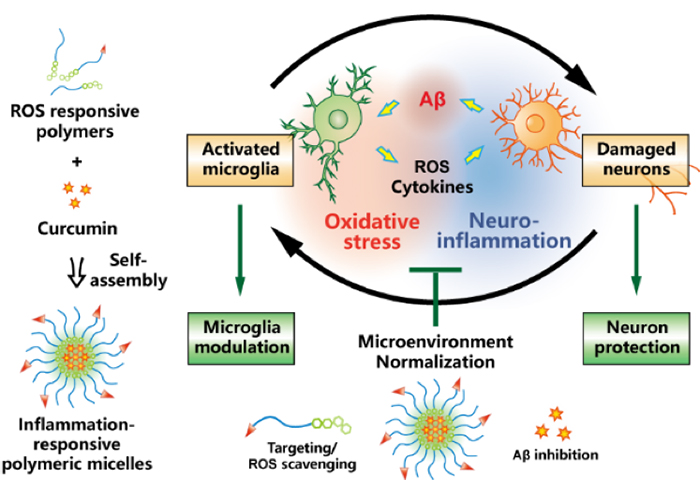
Recently, Professor Chen Jiang’s group from Fudan University School of Pharmacy developed a polymeric micelle drug delivery system with novel functions in modulating brain disease microenvironment and investigated its efficacy in treating Alzheimer’s disease (AD). The study was published on Advanced Science entitled ‘Microenvironment Remodeling Micelles for Alzheimer's Disease Therapy by Early Modulation of Activated Microglia’.
Drug development for neurodegenerative diseases has always been a huge problem worldwide. Hundreds of potential drugs for AD treatment have failed since 1998. Unfortunately, nearly all the antibodies based on the mainstream ‘β-amyloid hypothesis’ were also claimed ineffective in clinical trials in the past few years. With the severe aging of population and the gradually increased mobility, effective AD therapies are on demand.
With the experience of successive failure in the past, researchers point out that AD treatment should pay more attention on the early phase of the disease progression. Diagnostic mild cognitive impairment is the hallmark of an already late stage in AD progression when irreversible brain damage occurs and cannot be cured by neuroprotection or the removal of amyloid deposition. This could explain the successive failures of Aβ antibodies in clinical trials during late years. Microglia are the intrinsic cerebral immune cells precisely tailored by brain environment. Their abnormal activation in early stage of AD forms a neuroinflammatory and oxidative microenvironment, which affects the brain metabolism and is closely related with disease deterioration. Based on the characteristics of the AD microenvironment, a polymeric micelle responsive to the high reactive oxygen species (ROS) level in inflammatory lesion was applied as the carrier and was modified with a AD brain-targeting peptide and loaded with a hydrophobic drug curcumin, composing a microenvironment-remodeling drug delivery system (Figure 1). The polymeric micelles could accumulate into the AD brain and eliminate the ROS and Aβ oligomers through the combined effects of the polymers and curcumin. This helped block their chronic activation of microglia, which eventually reeducated their states and normalized the brain microenvironment. This microenvironment-remodeling strategy has been proved effective in improving the cognitive functions of AD model mice and provides a novel orientation for AD treatment.
Yifei Lu, a PhD student from School of Pharmacy, Fudan University, is the first author, and Prof. Chen Jiang is the corresponding author. This study was supported by National Natural Science Foundation of China for Distinguished Young Scholars and Shanghai Outstanding Academic Leaders Plan.

Illustration of microglia induced AD microenvironment and mechanisms of APLB/CUR modulation